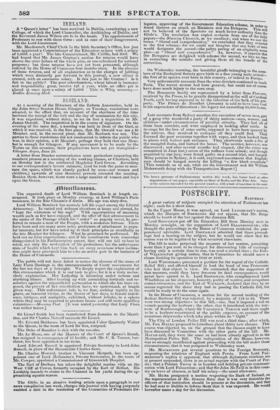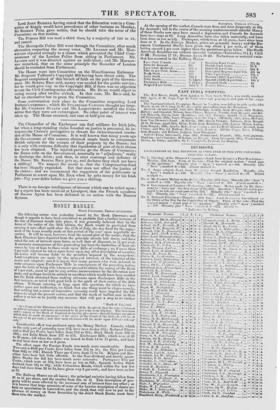POSTSCRIPT.
SATURDAY.
In the Upper House, it was agreed, on Lord LvsnueusT's motion, which the Marquis of NORMANBY did not oppose, that Mr. Burge should be heard zit the bar against the Jamaica Bill.
Lord BROUGHAM put off his Education 13i11 from Monday next to Monday sennight, on the suggestion of Lord ELLENBOROUGLI who thought the proceedings in the House of' Commons rendered the post- ponement advisable. Lord lleoutioAir admitted that those proceed- iugs had a bearing on the subject, but he would not allow that his course was to be regulated by what occurred elsewhere.
The bill to make perpetual the measure of last session, permitting more than 5 per cent, to be charged for discounting bills of exchange having only a certain time to run, was read a second tints; the Duke of WELLINGTON giving notice, that in Committee lie should more a clause limiting its operation to 1842 or 1843.
Lord WINCIIILSEA presented a petition for the repeal of the Catholic Relief Bill; and offered himself to lead the band of true Protestants who had that object in view. He contended, that the supporters of that measure, could they have foreseen its fatal consequences, would never have agreed to it. Lord BitouonAm, who complimented Lord Winchilsea on his eloquence, honesty, purity of motive, and scrupulous conscientiousness, and the Earl of WieteLow, declared that they by no means regretted the share they had in passing the Catholic Bill, but would be ready to do the sante again.
In the House of Commons, a motion for the second reading of the Redcar Harbour Bill was rejected, by a majority of 118 to 32. There were two strong objectioes to this bile—one, that it imposed a toll on vessels passing the harbour ; the other, that it interfered with the inte- rests of Scarborough, where Sir FREDERICK TRENCII said there ought to be a harbour constructed at. the public expense, on account of the numerous shipwrecks which take place within its " bight."
The City of London Police Bill was read a third time ; after which, Mr. Fox MAeLE proposed to introduce about thirty new clauses. Thus course was objected to, on the ground that the clauses ought to have been discussed in Committee with the other parts of the bill. Mr. MAEEE said, they were the saute as had been already agreed to in the Metropolitan Police Bill. The indisposition of the House, however, was so strongly manifested against proceeding with the bill under those circumstances, that it was postponed to Wednesday next.
Mr. MACKINNON put several questions to the Foreign Secretary, respecting the relations of England with Persia. From Lord PAL- MERSTON'S replies it appeared, that although diplomatic relations are at present suspended, there is no actual rupture with the Court of Per- sia; that a Persian Envoy is in London and holding private communi- cation with Lord Palmerston; and that Sir John McNeill is in this coun- try on leave of absence, at half his salary—the usual allowance.
Mr. HUME postponed a motion respecting the Bank of Ireland, on the representation of Mr. SPRING RICE that it was very desirable the officers of that institution should be present at the discussion, and that he had sent to Dublin to inform them that it was expected. He would hereafter name a day for the discussion. • Lord JOBB RUSSELL having stated that the Education vote in a Com- mittee of Supply would have precedence of other business on Monday, Sir ROBERT PEEL gave notice, that he should take the sense of the Committee on that motion.
The Prisons Bill was read a third time, by a majority of 126 to 21, and passed.
The Metropolis Police Bill went through the Committee, after much altercation respecting the money votes. Mr. LEADER and Mr. MAC- gosoN objected strongly to a clause which prevented the Chief Com- missioner of the London Police from sitting in Parliament. Mr. LEADER said it was directed against an individual ; and Mr. MActuts- NON remarked, that on the same principle the Recorder of London should be excluded from Parliament. The House went into Committee on the Miscellaneous Estimates Mr. Sergeant Talfourd's Copyright Bill having been thrust aside. The Sergeant complained of this breach of faith on the part of the Govern- ment. Mr. SPRING RICE said, money was needed for the public service ; but he would give way to the Copyright Bill, if there was no objection to vote the Civil Contingencies afterwards. Mr. Ilumr; would object to voting money after 'twelve o'clock. In that case, Mr. Ricli said, he had no alternative but to press the Committee.
Some conversation took place in the Committee respecting Lord Durham's expenses ; which Sir STaArsoun CANNING thought too large. But Mr. CHARLES .111.71.1.En and Mr. LAII0t3CHERE satisfied the Com- mittee that they were not extravagant. No other point of interest was taken up. The House resumed, and rose at half-past one.



























 Previous page
Previous page